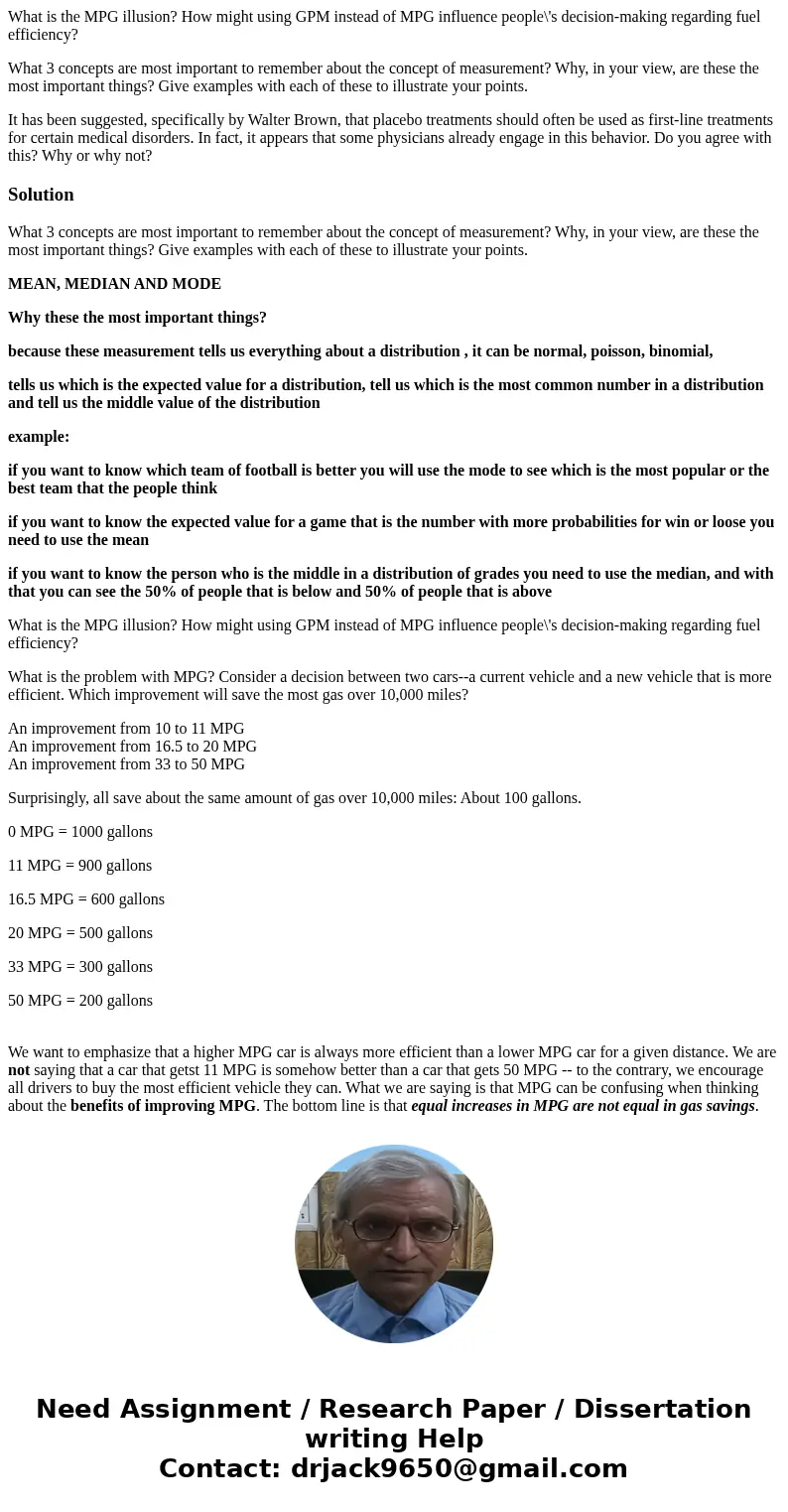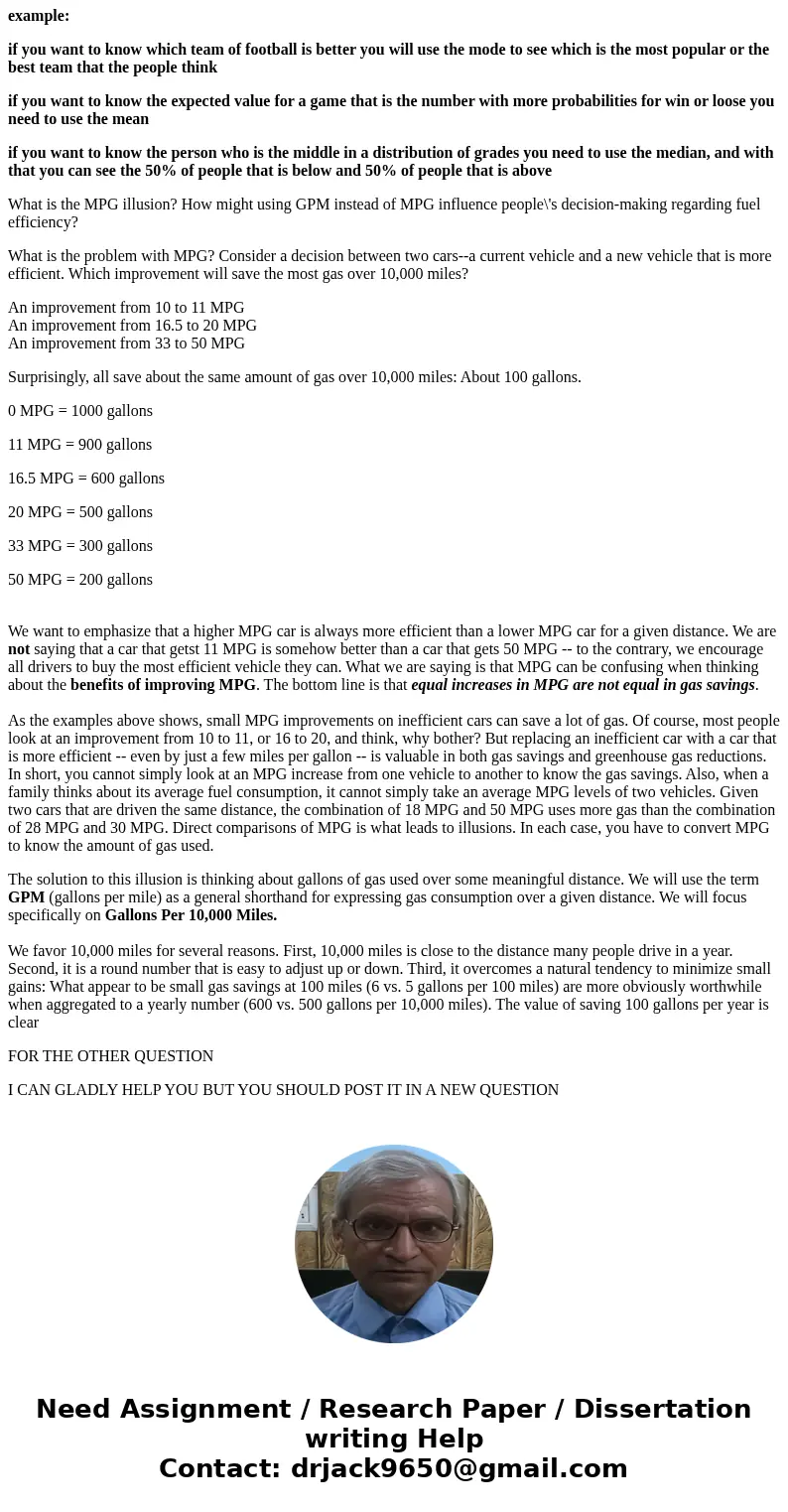What is the MPG illusion How might using GPM instead of MPG
What is the MPG illusion? How might using GPM instead of MPG influence people\'s decision-making regarding fuel efficiency?
What 3 concepts are most important to remember about the concept of measurement? Why, in your view, are these the most important things? Give examples with each of these to illustrate your points.
It has been suggested, specifically by Walter Brown, that placebo treatments should often be used as first-line treatments for certain medical disorders. In fact, it appears that some physicians already engage in this behavior. Do you agree with this? Why or why not?
Solution
What 3 concepts are most important to remember about the concept of measurement? Why, in your view, are these the most important things? Give examples with each of these to illustrate your points.
MEAN, MEDIAN AND MODE
Why these the most important things?
because these measurement tells us everything about a distribution , it can be normal, poisson, binomial,
tells us which is the expected value for a distribution, tell us which is the most common number in a distribution and tell us the middle value of the distribution
example:
if you want to know which team of football is better you will use the mode to see which is the most popular or the best team that the people think
if you want to know the expected value for a game that is the number with more probabilities for win or loose you need to use the mean
if you want to know the person who is the middle in a distribution of grades you need to use the median, and with that you can see the 50% of people that is below and 50% of people that is above
What is the MPG illusion? How might using GPM instead of MPG influence people\'s decision-making regarding fuel efficiency?
What is the problem with MPG? Consider a decision between two cars--a current vehicle and a new vehicle that is more efficient. Which improvement will save the most gas over 10,000 miles?
An improvement from 10 to 11 MPG
An improvement from 16.5 to 20 MPG
An improvement from 33 to 50 MPG
Surprisingly, all save about the same amount of gas over 10,000 miles: About 100 gallons.
0 MPG = 1000 gallons
11 MPG = 900 gallons
16.5 MPG = 600 gallons
20 MPG = 500 gallons
33 MPG = 300 gallons
50 MPG = 200 gallons
We want to emphasize that a higher MPG car is always more efficient than a lower MPG car for a given distance. We are not saying that a car that getst 11 MPG is somehow better than a car that gets 50 MPG -- to the contrary, we encourage all drivers to buy the most efficient vehicle they can. What we are saying is that MPG can be confusing when thinking about the benefits of improving MPG. The bottom line is that equal increases in MPG are not equal in gas savings.
As the examples above shows, small MPG improvements on inefficient cars can save a lot of gas. Of course, most people look at an improvement from 10 to 11, or 16 to 20, and think, why bother? But replacing an inefficient car with a car that is more efficient -- even by just a few miles per gallon -- is valuable in both gas savings and greenhouse gas reductions.
In short, you cannot simply look at an MPG increase from one vehicle to another to know the gas savings. Also, when a family thinks about its average fuel consumption, it cannot simply take an average MPG levels of two vehicles. Given two cars that are driven the same distance, the combination of 18 MPG and 50 MPG uses more gas than the combination of 28 MPG and 30 MPG. Direct comparisons of MPG is what leads to illusions. In each case, you have to convert MPG to know the amount of gas used.
The solution to this illusion is thinking about gallons of gas used over some meaningful distance. We will use the term GPM (gallons per mile) as a general shorthand for expressing gas consumption over a given distance. We will focus specifically on Gallons Per 10,000 Miles.
We favor 10,000 miles for several reasons. First, 10,000 miles is close to the distance many people drive in a year. Second, it is a round number that is easy to adjust up or down. Third, it overcomes a natural tendency to minimize small gains: What appear to be small gas savings at 100 miles (6 vs. 5 gallons per 100 miles) are more obviously worthwhile when aggregated to a yearly number (600 vs. 500 gallons per 10,000 miles). The value of saving 100 gallons per year is clear
FOR THE OTHER QUESTION
I CAN GLADLY HELP YOU BUT YOU SHOULD POST IT IN A NEW QUESTION


 Homework Sourse
Homework Sourse